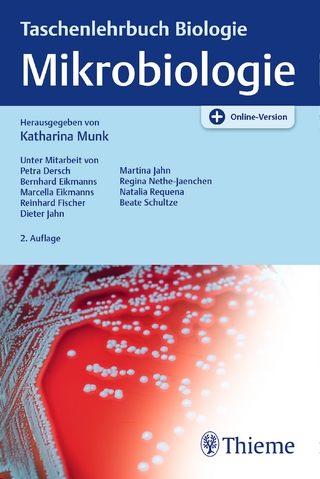
Bacterial Survival in the Hostile Environment
Academic Press Inc (Verlag)
978-0-323-91806-0 (ISBN)
Dr. Ashutosh Kumar is an active researcher and scientific writer in his field for over 14 years and presently working at Department of Microbiology, Tripura University (A Central University), Suryamaninagar, Agartala, Tripura, India. He received MSc and PhD degree in Biotechnology from University of Hyderabad, India. He did his postdoctoral research at TIFR-National Centre for Biological Sciences Bangalore, Indian Institute of Technology Delhi and Jamia Hamdard, New Delhi, India. He also worked as a Visiting Research Scientist at Robert Koch Institute Berlin, Germany. He has made significant contributions to the study of virulence mechanisms and strategies of survival, adaptation, and persistence of Mycobacterium tuberculosis. He was involved in identification of an enzyme from M. tuberculosis that promote biofilm formation and drugs that enhanced the potency of two current anti-tuberculosis antibiotics. He received many scholarships, awards, and fellowship during his education. He has many publications in international journals and books. Dr. Tenguria is an active researcher and currently working as Project Scientist in Cedars-Sinai Medical Center, Los Angeles, CA USA. He has been actively involved in research and training of graduate and undergraduate students. He received his MSc in Life Sciences from University of Rajasthan, Jaipur and PhD in Biotechnology from University of Hyderabad, Hyderabad, India. He received his postdoctoral training from Purdue University, Indiana, USA and Cedars-Sinai Medical Center (UCLA), Los Angeles, California, USA. Currently, he is working in the area of molecular innate immunity to unravel molecular signaling mechanics for sensing danger (infectious pathogens) signals through cytosolic receptors of the innate immune system of human and mouse hosts. With his doctoral and postdoctoral fellowships and research in the area of host-microbe interactions, bacterial survival and pathogenesis, he made seminal contributions by publishing in international Jr (Cell Host-Microbe, Nature Commun, Frontiers).
Part 1: 1. Pathogenic adaptation to host environment 2. Adaptation to acidic environment 3. Microaerobic conditions 4. Immune system stress 5. Metal stress
Part 2: Modulation of host pathways by pathogens for adaptation/survival 6. Modulation in glycolytic flux 7. Endoplasmic reticulum stress 8. Host Mitochondria 9. Apoptosis 10. Necrosis 11. Phagosome maturation 12. Autophagy regulation
Part 3: Dormancy, Drug Tolerance and Resistance 13. Growth regulation by microbes 14. Survival and reactivation strategies of pathogens in stress through heterogeneous population generation 15. Persisters 16. Antimicrobial resistance
Part 4: Proteins for stress survival 17. Chaperones 18. Ribosome associated proteins 19. Methyltransferases 20. Proteins responsible for growth regulation of bacteria during unfavourable conditions 21. Proteins involved in biofilm
Part 5: Adaptation to Extreme Environment 22. Adaptations to Ph 23. Temperature 24. Pressure 25. Halophilic adaptations 26. Radiation adaptation
| Erscheinungsdatum | 10.10.2022 |
|---|---|
| Reihe/Serie | Developments in Applied Microbiology and Biotechnology |
| Verlagsort | Oxford |
| Sprache | englisch |
| Maße | 191 x 235 mm |
| Gewicht | 570 g |
| Themenwelt | Naturwissenschaften ► Biologie ► Mikrobiologie / Immunologie |
| ISBN-10 | 0-323-91806-9 / 0323918069 |
| ISBN-13 | 978-0-323-91806-0 / 9780323918060 |
| Zustand | Neuware |
| Haben Sie eine Frage zum Produkt? |
aus dem Bereich


